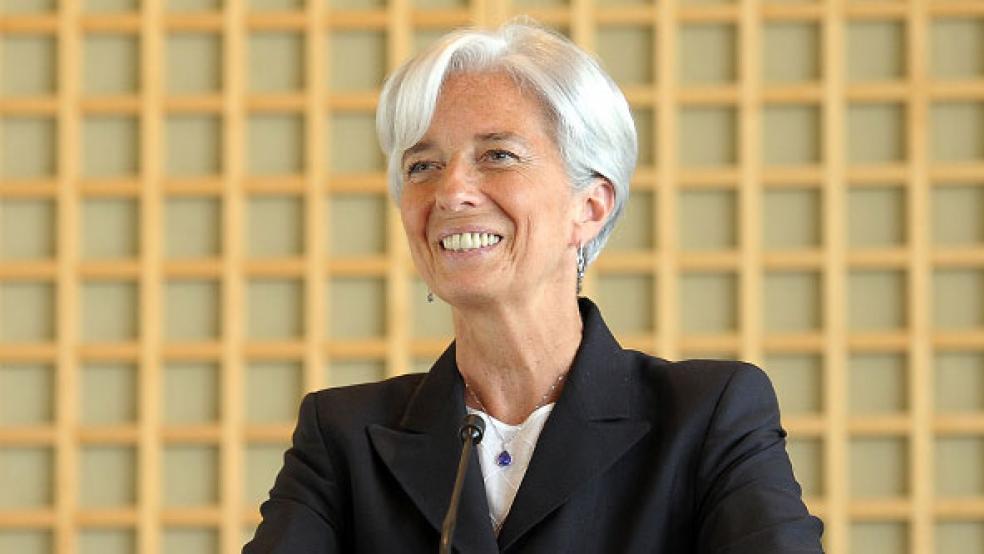Never before has a woman served as full-time head of the International Monetary Fund. But support for the candidacy of French Finance Minister Christine Lagarde to succeed the disgraced Dominique Strauss-Kahn as IMF president has been growing in recent days, andironically, it may take a push from two prominent women to help herbreak the organization’s glass ceiling.
At a conference in Paris earlier this week, Secretary of State Hillary Clinton stopped short of endorsing Lagarde, but said that the United States “welcome[s] women who are well qualified and experienced to head major organizations such as the IMF.” German Chancellor Angela Merkel, arguably Europe’s most powerful and influential leader, announced that she had high regard for Lagarde, but said there would not be a unified European position on the choice.
Lagarde, 55, a lawyer and finance expert who played an important role in managing the euro crisis, declared her candidacy at a news conference on Wednesday, and promised to travel over the next weeks to listen and and seek support from other IMF members. Her main rival appears to be Agustin Carstens, the Mexican central bank governor. However, representatives from IMF’s so-called BRICS countries – Brazil, Russia, , India, China and South Africa – released a letter calling for a non-European IMF chief. Traditionally, an American runs the World Bank, while the French hold the presidency of the IMF.
“Several international agreements have called for a truly transparent, merit-based and competitive process for the selection” of the IMF president, the representatives wrote. "This requires abandoning the obsolete unwritten convention that requires that the head of the IMF be necessarily from Europe."
Lagarde, for her part, has called for a merit-based search for IMF president. She has also said that in a merit-based race, she is the clear winner.
“I honestly think that the nationality, the origin, is something that doesn't really matter at the end of the day,” she said. “What matters is the skills, the expertise, the experience, the willingness, the enthusiasm, the leadership, the background.” She added that she has a keen understanding of “the political circumstances and background” of debt-ridden European economies. A tall, tanned, strikinglooking woman, Lagarde is considered something of a political outsider in France. She broke into Paris’s elite political and government services after working at Baker & McKenzie, an American law firm, for nearly 25 years. She frequently recalls that she turned to Baker & McKenzie after being told during an interview with a French firm that she would never make partner because she was a woman, according to The New York Times.
She is seeking election to a full term as president of the IMF. Although Anne Osborn Krueger, an American, served as temporary managing director of the IMF for several months in 2004, no woman has ever held the top IMF post on a permanent basis.
Erik Jones, professor of European studies at the John Hopkins School of Advanced International Studies’ Bologna Center, said that Lagarde’s European experience is needed to steer Europe out of its continuing debt crisis. “The BRICS countries have legitimate concerns about [Lagarde’s] political symbolism, but the situation in Europe is so delicate right now. Personally I’m in no mood for experimentation.”
But Jones also said that Lagarde’s presidency would be the end of an era, both at the IMF and at the World Bank.
“This is going to be the last hand-picked candidate. It has to change,” Jones said, adding that the next IMF and World Bank president would come from a country with an emerging economy.
One reason to pick a non-traditional leader is practicality. The world economy is changing, and politicians, diplomats and economists from emerging market countries now receive the same American and European education as their Western counterparts. It makes sense to helm the IMF and World Bank with candidates that best understand emerging economies.
The second reason, according to Jones, is the poor track record of recent leaders. Former World Bank President Paul Wolfowitz was forced to resign under a cloud of ethics violations, including giving improper benefits to his partner Shaha Riza. Strauss-Kahn resigned the IMF post last week after being charged with sexually assaulting a housekeeper in a New York hotel. He is under house arrest in a multi-million-dollar New York apartment complex, awaiting trial.
“This is the second time in a row that a hand-picked leader of one of the financial institutions had to be replaced,” Jones said. “It’s not as if we’ve been doing an outstanding job picking candidates.”
Related Links:
Lagarde Pushes Her Credentials to Take IMF Post (Washington Post)
Obama to Face Pressure Over Lagarde’s IMF Bid (Wall Street Journal)





